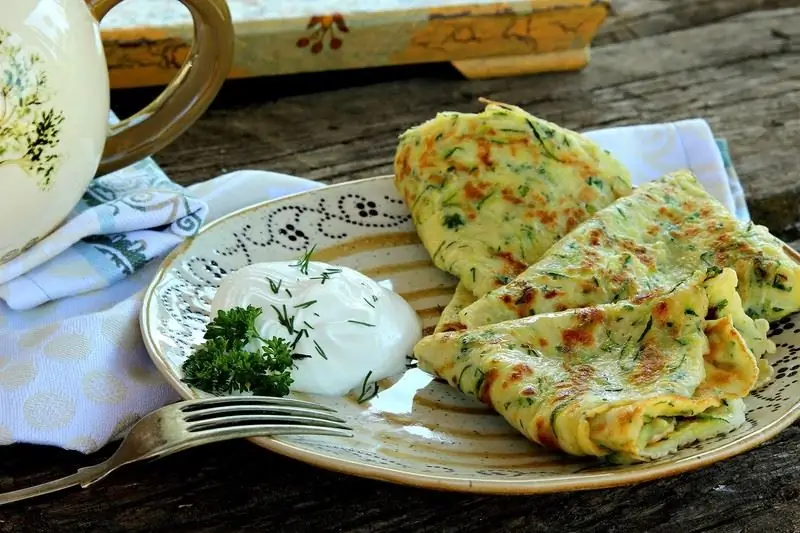
Table of contents:
- Author Bailey Albertson albertson@usefultipsdiy.com.
- Public 2023-12-17 12:53.
- Last modified 2025-06-01 07:32.
Drowned dough: a gloomy name and a great result

Yeast dough with a gloomy name "Drowned" compares favorably with its "counterparts" splendor, ease of use and the minimum cooking time. It takes him about 30 minutes to get up, as opposed to 2-3 hours that this process usually takes. It's all about the unique technology.
How to make drowned dough
Why does yeast dough rise? This is the fault of the yeast, which, once in certain conditions - heat, the presence of flour and sugar - begin to ferment, "eating" carbohydrates and emitting carbon dioxide and alcohol instead. Alcohol evaporates during its stay in the oven, but carbon dioxide does all the work, first forcing the dough to increase in volume, and then providing it with a porous structure so dear to lovers of yeast baking.

The increase in volume and looseness of the dough is due to carbon dioxide
If you leave the dough to rise on the table under a towel, it will rise slowly, as some of the carbon dioxide will escape into the air. But it is worth lowering the mixed ball into the water, and the process will go twice as fast, since the water will prevent the gas from escaping. As a result, you will have an airy, light, soft dough in your hands, from which wonderful buns, pies, pies, whites, pizzas - in a word, any yeast baked goods are made.
Dough with milk
To make floating dough you will need:
- 500 g wheat flour;
- 100 g butter or margarine;
- 250 ml of milk;
- 1 egg;
- 20 g fresh yeast or 7 g dry;
- 15 g sugar;
- 0.5 tsp salt.
Cooking.
-
Mash finely chopped yeast with sugar.

Yeast pieces are mixed with sugar Dry yeast can be immediately poured with warmed milk, and then mixed with sugar
-
Heat the milk to a temperature of 35-37 ° - that is, to about body temperature - and add to the bowl to the yeast.

Milk on the stove Be careful: too cold milk will have no effect, too hot will kill the yeast
-
Next, stir in 5-7 tbsp. l. flour and leave the dough in a warm place for a quarter of an hour.

Dough for dough Some housewives skip the dough stage, immediately kneading the dough, but it is better not to regret extra 15 minutes on it.
-
Whisk the egg and salt.

Beaten egg With an egg, the dough will become more elastic and tastier.
-
Cut the softened butter into small pieces.

Pieces of butter Remove the oil from the refrigerator in advance, so it reaches the desired temperature by itself
-
Add butter, egg and sifted flour, except for the last 3-4 spoons, to the dough and knead the dough.

Dough kneading process Try hard, it depends on your efforts how quickly the dough comes up
-
Roll the dough into a ball and dip in a pot of cold water. You can pre-wrap it in a linen napkin or tie it in a greased plastic bag.

Ball of dough in a pot of water Whether to dip the dough in water as it is or wrap it in a package, you decide for yourself
-
After 15-30 minutes, the dough will float.

The dough floats on the surface of the water Once the dough has surfaced, it is ready to bake.
-
Blot it with a paper towel or remove it from the bag, knead it with the last remaining spoons of flour, let it rest for a quarter of an hour in a warm place and start sculpting whatever you want.

Final kneading of the dough It remains the last time to knead the dough and you can start baking
Video: preparing whey dough
Despite the strange name, the drowned dough has a very pleasant texture and taste. And how it rises in the oven! Consider this fact and leave enough space on the baking sheet between the future pies and rolls so that they do not stick together.
Recommended:
Cottage Cheese Dough Rolls Are More Tender Than Tender: A Step-by-step Recipe With Photos And Videos

How to cook cottage cheese rolls in the oven. Step by step recipe
Cinnamon And Sugar Buns Made From Yeast Dough: A Step-by-step Recipe With Photos And Videos

How to make cinnamon sugar buns from yeast dough. Step-by-step instructions with photos and videos
Thin Pancakes With Holes On Whey: A Step-by-step Recipe With Photos And Videos

How to cook thin pancakes with holes in whey. Step by step recipe
Sweets From Powdered Milk And Cocoa At Home: A Step-by-step Recipe With Photos And Videos

How to make candies from powdered milk and cocoa at home. Step-by-step instructions with photos and videos
Zucchini Pancakes With Milk And Kefir: Step By Step Recipes, Simple And Tasty, Photo And Video

How to cook zucchini pancakes (with milk, kefir, with cheese, garlic, minced meat, etc.) - simple and delicious step-by-step recipes with photos and videos
